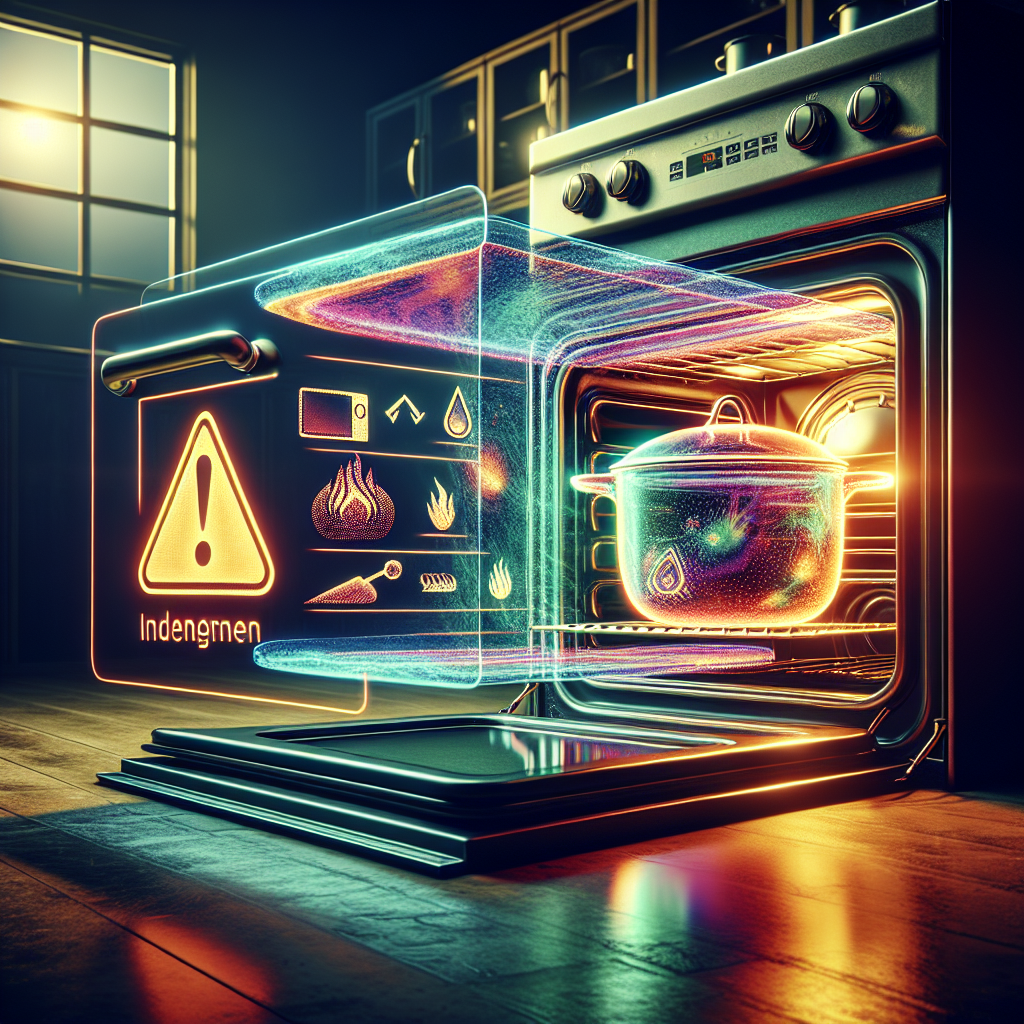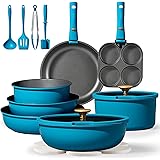When it comes to using glass cookware in the oven, it’s important to be aware of the safety considerations involved. While glass cookware can be a versatile and convenient option for baking and roasting, there are certain precautions you should take to ensure a safe culinary experience. From selecting the right type of glass to avoiding sudden temperature changes, this article will provide you with valuable insights on how to use glass cookware in the oven without any worries. So, let’s dive in and explore the essential safety tips that will help you make the most out of your glass cookware!
Some suggestions to consider!
SODAY 12 Pcs Pots and Pans Set Non Stick, Cookware Sets Black Granite Induction Cookware, Non-toxic Healthy Nonstick Kitchen Cooking Set with Frying Pans Set, Saucepans (PFAS/ PFOA/ PFOS Free)
$59.99 (as of February 23, 2026 10:04 GMT +00:00 - More infoProduct prices and availability are accurate as of the date/time indicated and are subject to change. Any price and availability information displayed on [relevant Amazon Site(s), as applicable] at the time of purchase will apply to the purchase of this product.)SENSARTE Nonstick Ceramic Cookware Set 13-Piece, Healthy Pots and Pans Set, Non-toxic Kitchen Cooking Set with Stay-Cool Handles, Silicone Tools and Pot Protectors, PFAS and PFOA Free
$65.94 (as of February 23, 2026 10:04 GMT +00:00 - More infoProduct prices and availability are accurate as of the date/time indicated and are subject to change. Any price and availability information displayed on [relevant Amazon Site(s), as applicable] at the time of purchase will apply to the purchase of this product.)CAROTE 21pcs Pots and Pans Set, Nonstick Cookware Set Detachable Handle, Induction Kitchen Cookware Sets Non Stick with Removable Handle, RV Cookware Set, Peacock Blue
$79.99 (as of February 23, 2026 10:04 GMT +00:00 - More infoProduct prices and availability are accurate as of the date/time indicated and are subject to change. Any price and availability information displayed on [relevant Amazon Site(s), as applicable] at the time of purchase will apply to the purchase of this product.)
The Importance of Safety Considerations
Using glass cookware in the oven can provide numerous benefits, such as even cooking and easy monitoring of the food’s progress. However, it is essential to prioritize safety when using glass cookware to prevent accidents and minimize the risk of injury. This article will outline the crucial safety considerations when using glass cookware in the oven, including preventing glass breakage, avoiding thermal shock, and preventing burns and cuts.
Preventing Glass Breakage
Glass cookware can break if not handled properly, which can lead to a potential danger of hot food or liquids spilling and causing burns or cuts. To prevent glass breakage, it is important to follow a few guidelines.
Look for Oven-Safe Labels
When purchasing glass cookware, always ensure that it is labeled as oven-safe. The presence of an oven-safe label indicates that the cookware has been designed to withstand the high temperatures of the oven and is less likely to break or shatter.
Check for Temperature Limitations
Each piece of glass cookware comes with a designated temperature range that it can withstand. Before using glass cookware in the oven, check the manufacturer’s instructions or label to verify the recommended temperature limitations. Exceeding the recommended temperature can increase the risk of glass breakage.
Consider the Type of Glass
Different types of glass have different strengths and abilities to resist thermal shock. Borosilicate glass, such as Pyrex, is known for its high resistance to sudden temperature changes, making it a popular choice for oven use. When choosing glass cookware, opt for borosilicate glass to minimize the risk of breakage.

Avoiding Thermal Shock
Thermal shock occurs when there is a sudden and extreme change in temperature, causing the glass to expand or contract rapidly. This can result in the glass cookware cracking or breaking. To avoid thermal shock, consider the following tips.
Gradual Temperature Changes
When using glass cookware in the oven, it is crucial to introduce gradual temperature changes. Avoid placing cold glass cookware directly into a preheated oven, as the sudden temperature change can lead to thermal shock. Instead, place the cookware in a cool oven and let it heat up gradually as the oven warms.
Preventing Freezer-to-Oven Transfers
Glass cookware should never be transferred directly from the freezer to the oven. The drastic change in temperature can cause the glass to fracture, putting both the cookware and the user at risk. Allow the glass cookware to thaw at room temperature before placing it in the oven.
Avoiding Direct Heat Exposure
Ensure that glass cookware does not come into direct contact with a heat source, such as a stovetop burner. The intense heat can cause the glass to expand unevenly, increasing the risk of thermal shock. Always use a proper trivet or heat-resistant surface to protect the glass cookware.
Preventing Burns and Cuts
When handling hot glass cookware, it is crucial to take precautions to prevent burns and cuts.
Using Oven Mitts or Pot Holders
Always use oven mitts or pot holders to handle hot glass cookware. The cookware can retain heat for an extended period, and without proper protection, it can cause severe burns on the skin. Be mindful of the hot handles and ensure a firm grip while moving the cookware.
Placing on Heat-Resistant Surfaces
After removing the glass cookware from the oven, place it on a heat-resistant surface, such as a trivet or hot pad. Avoid placing it directly on a countertop or table, as the extreme heat can damage the surface and increase the risk of accidents.
Avoiding Abrupt Surface Changes
To prevent the glass cookware from cracking due to sudden temperature changes, avoid placing it on cold or wet surfaces immediately after removing it from the oven. Rapid temperature changes can cause thermal shock and potential breakage. Allow the cookware to cool gradually before exposing it to different surfaces.

Cleaning and Maintenance
Proper cleaning and maintenance of glass cookware are essential to prolong its lifespan and ensure its safety.
Allowing Cookware to Cool
After use, allow glass cookware to cool down completely before cleaning. Placing hot glass cookware in contact with cold water or cleaning solutions can cause thermal shock and lead to breakage.
Avoiding Abrupt Temperature Changes
When cleaning glass cookware, avoid subjecting it to dramatic temperature changes. If the cookware is hot, let it cool down before cleaning. Similarly, avoid cleaning an extremely cold piece of glass cookware with hot water. Gradual temperature changes are crucial for the longevity and safety of the cookware.
Properly Handling Chipped Glass
If you notice any chips or cracks in your glass cookware, it is best to discontinue its use. Chipped glass is more prone to breakage and can pose a safety risk. Handle the damaged cookware with caution and dispose of it properly to avoid any accidents.
Potential Risks and Hazards
Using glass cookware in the oven carries potential risks and hazards that should not be overlooked.
Glass Breakage
One of the primary safety concerns when using glass cookware is the risk of glass breakage. This can occur due to various factors, including improper handling, manufacturing defects, or exposure to thermal shock. To minimize the risk, follow the safety guidelines mentioned throughout this article and choose high-quality oven-safe glass cookware.
Explosion Due to Defects or Improper Handling
In rare cases, glass cookware may explode due to defects or improper handling. If a glass cookware explodes in the oven, it can be extremely dangerous, potentially causing burns or cuts from flying glass fragments. Always inspect the cookware for any visible defects and handle it with care to reduce the risk of an explosion.
Exposure to Sharp Edges and Fragments
When glass cookware breaks, sharp edges and fragments can be produced, posing a risk of cuts and injuries. If a piece of glass cookware breaks, carefully dispose of the shards, ensuring that none remain in the oven or other surfaces. Be cautious while cleaning up broken glass to avoid any injuries.

Alternatives to Glass Cookware
If the safety considerations of using glass cookware in the oven are a concern, there are alternatives available that can provide a safer cooking experience.
Stainless Steel Cookware
Stainless steel cookware is known for its durability and resistance to high temperatures. It does not pose the risk of glass breakage and can handle a variety of oven cooking tasks with ease.
Cast Iron Cookware
Cast iron cookware is renowned for its excellent heat retention and distribution. It can efficiently withstand high temperatures and offers versatility for both oven and stovetop cooking.
Ceramic Cookware
Ceramic cookware is a popular alternative to glass cookware due to its thermal resistance and aesthetic appeal. It can be used in the oven and is available in various designs and colors.
Special Considerations for Pyrex and Borosilicate Glass
Pyrex and other types of borosilicate glass have specific features that make them particularly suitable for oven use.
Increased Resistance to Thermal Shock
Pyrex and borosilicate glass have a higher resistance to sudden temperature changes compared to regular glass. This enhanced thermal shock resistance minimizes the risk of breakage when exposed to extreme temperature variations, making them suitable for oven use.
Reduced Risk of Glass Breakage
The unique composition of borosilicate glass used in Pyrex and similar products makes it less prone to breakage compared to other types of glass. This reduces the risk of glass breakage and potential accidents, providing a safer option for oven cooking.
Transitioning from Oven to Stovetop
Pyrex and borosilicate glass are designed to withstand a wide range of temperatures, making them suitable for various cooking methods. These types of glass cookware can easily transition from oven to stovetop, allowing for greater flexibility in the kitchen.

Conclusion
Using glass cookware in the oven can elevate your cooking experience, but it is crucial to prioritize safety. By following the safety considerations outlined in this article, such as preventing glass breakage, avoiding thermal shock, and handling hot glass cookware with care, you can minimize the risks and enjoy worry-free cooking. Additionally, considering alternatives to glass cookware and understanding the benefits of special types of glass, such as Pyrex and borosilicate glass, further enhances safety in the kitchen. Remember to prioritize safety, properly care for your glass cookware, and enjoy your cooking adventures with peace of mind.



